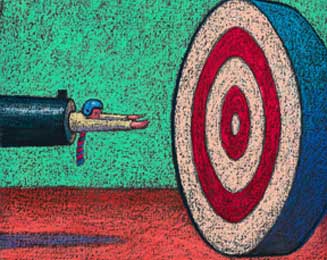Consultative Selling:
The Approach
DETERMINING WHO TO CALL ON AND INITIATING AN APPROACH are the most difficult parts of the sales process
for most salespeople, no matter what industry they�re in.
How often do we hide behind our desks doing unproductive work because we don�t have a targeted list
of prospects and a comfortable system for approaching them? Once we have an interested prospect, we
generally can proceed with confidence.
Call reluctance usually rises or falls in intensity depending on our current circumstances and recent
results. But remember this: Salespeople are paid more for their time than other professionals because
salespeople do what others are not comfortable doing. We can say that we are in the rejection business
because so many of our approaches have that result.
Our major problem, then, is not the economy or our product line. It is our own self-esteem and work organization.
Call reluctance thresholds are related directly to our self-esteem levels. A person with a healthy sense
of self worth is more willing to accept criticism, rejection, or even failure when pursuing a business
relationship. While no one enjoys rejection, individuals with high self-esteem are able to overcome it
and then move on to other opportunities.
High achievers count only their wins and ignore their losses. Outstanding success results most often
after high levels of initial failure. A key success factor is priority management and highest and best
use of time.
What to Avoid
Too often salespeople make frequent sales calls in an effort to simply be visible, hoping to get an
order by being �in the right place at the right time.� Being product pushers, such salespeople tend
to �show up and throw up.�
When meeting with a prospect, they do an �information dump� of product features. Is it any wonder that
some prospects place

�> Next Page
doberman pinschers at their front door when they see salespeople driving up?
But this obsolete sales method perpetuates itself since some success can be found when using it. Yet
it also is a prime cause of burnout, which occurs when we don�t establish career-building consultative
relationships.
If we aren�t constantly developing new referral relationships and adding value to old ones, we will be
forced to keep prospecting like a rookie.
A second career trap occurs once we�ve achieved an initial level of success. At times successful sales
reps slack off on new business development and �live off their own fat.� But when we fail to upgrade
our clientele continuously, we risk a falloff of income if any of our clients quit using us.
Becoming a professional salesperson isn�t that difficult. Experience shows that there are techniques
which can allow us to earn more while actually working less. We then tend to be excited about making
sales calls, and ultimately enjoy our career more than we previously had.
Here are the business development areas we will focus on in this issue of
Transaction World Magazine:
- Target Market Definition
- Approach Campaign
- Computer Assistance
Additionally, we start with several assumptions:
- We want to do business with highly-productive and well-qualified sources.
- We want to get most of our business from fewer sources.
- By constantly upgrading the quality of our sources, we will earn more with less effort.
- We need to create a positive environment in which prospects are receptive to our approach.
- We should invest in a computer and software to help us organize our marketing efforts and relationship maintenance.
Step I
Regardless of our current success level or the amount of time we�ve been in the business, we should
create a list of prospects we want to do business with.
In some industries, sales reps can work from a prospect list with as few as ten names, while others
require hundreds. A more seasoned sales professional typically needs fewer targets, since a clientele
has already been established.
Key to effective targeting is working from a written list. Preselecting prospects because of their
reputation, social style and need for our product or service is the foundation of our growing career.
Too often salespeople make calls in a territory and then work with whomever will give them an order.
Using this shotgun approach causes call reluctance and often is disappointing.